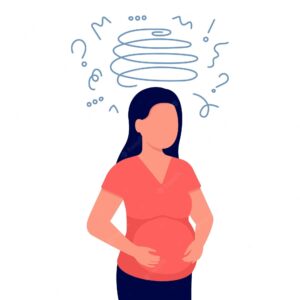Depression during pregnancy is more common than you might think. In fact, according to the research, about 1 in 10 women experience depression during pregnancy. If you are one of these women, it is important to seek help. Prepartum depression can be very dangerous for both you and your baby if left untreated. In this blog post, we will discuss what prepartum depression is, how to identify the symptoms, and what treatment options are available.
Contents
What Is Prepartum Depression?
 Prepartum depression is a type of clinical depression that can occur in the weeks or months leading up to childbirth. It’s important to note that prepartum depression is different from the “baby blues,” which are much more common and tend to be less severe.
Prepartum depression is a type of clinical depression that can occur in the weeks or months leading up to childbirth. It’s important to note that prepartum depression is different from the “baby blues,” which are much more common and tend to be less severe.
Prepartum depression is also known as prenatal depression, antenatal depression, or perinatal depression. Because all are used interchangeably, the term “prepartum depression” will be used throughout this article.
It can happen to any expectant mother, regardless of her age, race, or socioeconomic status. It’s important to remember that prepartum depression is not caused by anything the mother has done wrong. This is a serious mental illness that can be difficult to overcome without treatment. Seek help from your doctor or a mental health professional as soon as possible. The sooner you get treatment, the better for both you and your baby.
What Are The Signs And Symptoms?
There are a few key signs and symptoms to look out for if you think you or a loved one may be suffering from prepartum depression. These include:
- Persistent sadness or emptiness
- Loss of interest in activities that were once enjoyed
- Withdrawal from friends and family
- Increased irritability or anger
- Difficulty sleeping or sleeping too much
- Loss of appetite or overeating
- Decreased energy levels
- Anxiety
- Hopelessness
If you are experiencing any of these symptoms, it is important to reach out for help. Prepartum depression is a serious condition that should not be ignored. In fact, these symptoms can manifest in ways that are much more subtle.
For example, you may find yourself feeling more tearful than usual or having difficulty concentrating. If you are unsure whether or not you are suffering from prepartum depression, it is best to consult with a mental health professional who can properly assess your symptoms.
Is Prepartum An Early Sign Of Postpartum Depression?
 This is often the first question that comes to mind when a woman is experiencing depression during pregnancy. And while it’s normal to feel some anxiety and sadness during pregnancy, prepartum depression is a real condition that can have lasting effects on both mother and child.
This is often the first question that comes to mind when a woman is experiencing depression during pregnancy. And while it’s normal to feel some anxiety and sadness during pregnancy, prepartum depression is a real condition that can have lasting effects on both mother and child.
Prepartum depression is different from the “baby blues,” which are temporary and usually resolve within a few weeks postpartum. Prepartum depression is a more serious condition that can affect a woman’s ability to function during pregnancy and after childbirth.
So, postpartum depression might be an early sign of prepartum depression, but it’s important to remember that not all women who experience prepartum depression will go on to develop postpartum depression. And, even if a woman does develop postpartum depression, it doesn’t mean that her prepartum depression was necessarily the cause.
Some women might only suffer from prepartum depression, while others might experience both prepartum and postpartum depression. There is no one right way to cope with or treat either condition, but it’s important to seek professional help if you’re struggling.
What Causes Prepartum Depression?
The causes of prepartum depression are not fully understood, but several factors may contribute to its development. These are listed below:
Hormonal changes
The massive hormonal fluctuations that occur during pregnancy and in the postpartum period are thought to play a role in the development of prepartum depression. For example, the drop in estrogen and progesterone levels that occurs after childbirth may trigger depression in some women.
Life stressors
Pregnancy itself is a significant life stressor, and many women experience additional stressors such as financial problems or relationship difficulties during this time. Any of these stressors can trigger or worsen depression.
Sleep changes
It is very common for pregnant women to have difficulty sleeping, both falling asleep and staying asleep. This can be due to pregnancy hormones, anxiety about the baby, or physical discomfort from the pregnancy itself. With this, you might develop insomnia or hypersomnia, which can be a symptom of depression.
Fatigue and tiredness
Feeling exhausted all the time is another common cause of depression during pregnancy. Because your body is working overtime to support your growing baby, you may find yourself feeling more fatigued than usual. This can be exacerbated by pregnancy-related discomforts like nausea and back pain.
Risk factors
 In addition to these causes, some risk factors increase a woman’s chance of developing prepartum depression. These include:
In addition to these causes, some risk factors increase a woman’s chance of developing prepartum depression. These include:
- A personal history of depression or anxiety
- A family history of depression or anxiety
- Lack of social support
- Poor coping skills
- Unplanned pregnancy
- History of abuse or trauma
- Medical complications during pregnancy
If you have any of these risk factors, it’s important to be aware of the signs of prepartum depression and to talk to your doctor about ways to reduce your risk. It is a very difficult condition to deal with but does not lose hope because there are treatments available that can help.
How Does It Impact Mother-Child Bond?
Prepartum depression does not just impact the mother. It also takes a toll on the developing relationship between mother and child. When a mother is depressed, she may be less able to respond to her baby’s needs. This can make it difficult for her to bond with her child.
Additionally, preterm babies are more likely to be born to mothers who have prepartum depression. Preterm birth is associated with several health risks for the child, including respiratory problems, feeding difficulties, and jaundice.
Prepartum depression can also have long-term effects on the child. Studies have found that children of mothers with prepartum depression are more likely to experience behavioral problems, such as ADHD. They are also more likely to have poorer academic performance and lower IQ scores.
Therefore, you must not take this depression lightly and immediately seek professional help. It is treatable and there are many resources available to help you. You don’t have to suffer through this alone.
What Are The Other Consequences?
 Depression during pregnancy can lead to several other consequences as well. Some of these include:
Depression during pregnancy can lead to several other consequences as well. Some of these include:
- Increased risk of developing postpartum depression: It might seem counterintuitive, but women who experience depression during pregnancy are more likely to develop postpartum depression. This is because the hormonal changes that occur during and after pregnancy can exacerbate symptoms of depression.
- Problems with eating and sleeping: Many women with depression find that their appetite changes and they either lose or gain weight. They might also have trouble sleeping, which can lead to fatigue and further problems with concentrating and motivation.
- Increased stress levels: This is one of the most difficult things about depression during pregnancy. Not only are you dealing with your own mental health issues, but you’re also worried about the welfare of your unborn child. This can lead to even more anxiety and stress.
- Irritability and mood swings: Women and mood swings are often used in the same sentence, but pregnancy can amplify these emotions. If you’re already struggling with depression, it can be hard to manage sudden outbursts of anger or sadness.
If you’re experiencing any of these symptoms, it’s important to reach out for help. Depression is a serious mental illness that requires treatment. There are many resources available to you, so don’t hesitate to ask for help. Pregnancy is a time of joy and excitement, but it can also be a time of great anxiety and stress. So be aware and be kind to yourself.
How Is It Diagnosed?
Diagnosis of prepartum depression generally follows the same process as diagnosis of depression at other times during a woman’s life. It involves some common methods:
- A discussion with a mental health professional to discuss symptoms, feelings, and behaviors. This is sometimes called a clinical interview.
- The use of self-report depression scales, which are questionnaires that help quantify the severity of symptoms.
- In some cases, psychiatric evaluations or psychological testing may be used.
These are all generally safe to do during pregnancy. However, it’s important to remember that not all depression during pregnancy is prepartum depression. It’s possible to experience depression at any time during pregnancy (or after delivery) for a variety of reasons.
Therefore, it’s important to discuss any depressive symptoms with a mental health professional to get an accurate diagnosis and develop a treatment plan for you.
How Can You Treat It?
Like other forms of depression, treatment for prepartum depression generally includes some combination of medication and psychotherapy. Let’s discuss some common treatment options for prepartum depression:
Psychotherapy
 It is common for women with prepartum depression to see a therapist, counselor, or psychologist regularly. Psychotherapy can help you understand and cope with your thoughts and emotions related to your pregnancy. Some common types of psychotherapy used to treat prepartum depression include:
It is common for women with prepartum depression to see a therapist, counselor, or psychologist regularly. Psychotherapy can help you understand and cope with your thoughts and emotions related to your pregnancy. Some common types of psychotherapy used to treat prepartum depression include:
- Cognitive behavioral therapy (CBT): This type of therapy helps you identify and change negative thinking patterns.
- Interpersonal therapy (IPT): This type of therapy focuses on your relationships with others and how they may be affecting your mood.
- Support groups: These can provide social and emotional support from other women who are experiencing prepartum depression.
Medication
There are a variety of medication options available for the treatment of prepartum depression. Medications used to treat prepartum depression include:
- Selective serotonin reuptake inhibitors (SSRIs)
- Serotonin-norepinephrine reuptake inhibitors (SNRIs)
- Tricyclic antidepressants (TCAs)
- Atypical antipsychotics
- Monoamine oxidase inhibitors (MAOIs)
Your doctor will work with you to determine the best medication for your individual needs. It is believed that SSRIs are the safest class of medications to use during pregnancy. However, all medications come with the potential for side effects. Be sure to discuss the risks and benefits of any medication you are considering taking with your doctor.
Aromatherapy and Acupuncture
It is important to know that there are other options for treatments besides medication. Aromatherapy and acupuncture are two holistic approaches that can be used to help alleviate the symptoms of prepartum depression. These therapies can be used in conjunction with one another or as standalone treatments. If you are interested in exploring these options, be sure to consult with a qualified practitioner.
Self-care
 This is one o the essential things that you must do to help prevent or manage prepartum depression. It is important to take care of yourself both physically and emotionally. Here are some self-care tips:
This is one o the essential things that you must do to help prevent or manage prepartum depression. It is important to take care of yourself both physically and emotionally. Here are some self-care tips:
- Talk openly about how you’re feeling with your partner, friends, or family.
- Exercise regularly.
- Eat a balanced diet.
- Get enough sleep.
- Make time for yourself and things that make you happy.
- Spend time in nature
These are just a few self-care tips that can help you prevent or manage prepartum depression. If you are struggling with depression during pregnancy, please reach out to your healthcare provider for help. You are not alone. Also, remember that postpartum depression is different from baby blues and you should seek professional help if you think you may be suffering from postpartum depression.
Conclusion
In conclusion, prepartum depression can be a serious condition that can hurt both the mother and the child. If you are pregnant and feeling depressed, it is important to seek help from a healthcare provider or mental health professional. With proper treatment, most women with prepartum depression will be able to have a healthy pregnancy and delivery.
For more information and guidance please get in touch with our expert therapists at Therapy Mantra. They will be more than happy to assist you on your journey to recovery. Contact us today to learn more about our services. You can also book an online therapy session or download our free Android or iOS app.


